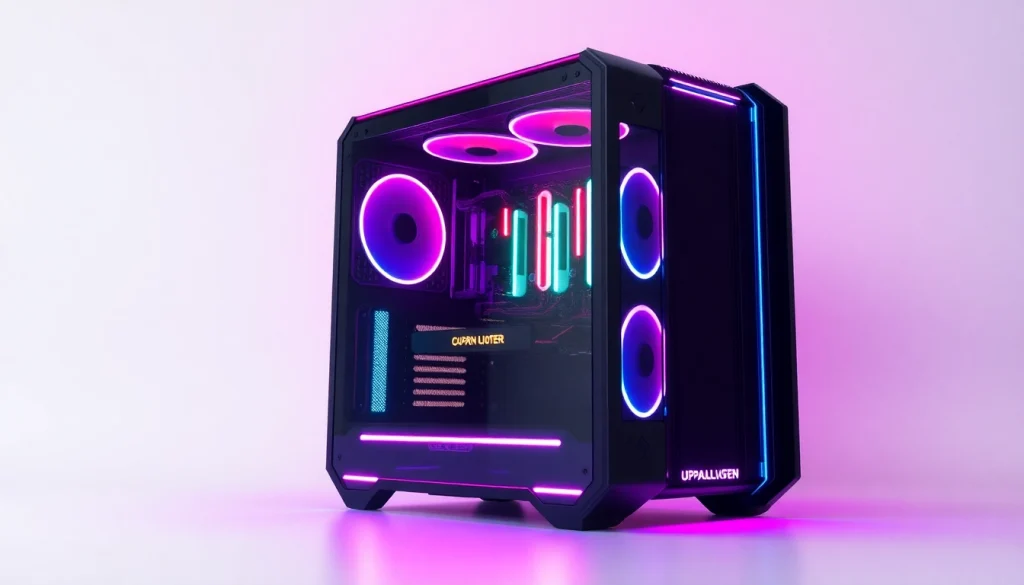Understanding Custom Gaming PC Cases
In the world of gaming, the experience often extends beyond just performance specifications and frame rates. For many gamers, their rig is not only a tool for gameplay but also a representation of their personality and style. One of the core elements that define the aesthetics and functionality of a gaming rig is the custom gaming pc case. These cases not only protect the hardware inside but also provide an opportunity for personalization that can elevate the entire gaming setup.
What is a Custom Gaming PC Case?
A custom gaming PC case is specifically designed enclosures that house all the essential components of a gaming computer, including the motherboard, CPU, GPU, and storage devices. What distinguishes custom cases from standard ones is the ability to tailor aspects such as size, materials, cooling options, and visual design.
Customization can take many forms, from laser engraving of unique designs to modular components that allow users to swap panels or designs. Service providers range from those offering complete case designs to individuals and companies that enable DIY enthusiasts to craft their cases from scratch.
Benefits of Custom Cases for Gamers
- Personalization: Custom cases allow gamers to express their individuality. Whether it’s a favorite game theme, color scheme, or custom lighting, players can showcase their style.
- Improved Functionality: Tailoring a case to specific requirements can enhance airflow, cable management, and expandability. This is particularly crucial for high-performance gaming systems that require optimal cooling.
- Durability and Quality: Quality materials used in custom cases can provide better durability, heat resistance, and longevity, protecting the machines against wear and tear.
- Easier Maintenance: Many custom designs incorporate features that simplify upgrades and maintenance, ensuring component access is straightforward.
Common Materials Used in PC Cases
The choice of material in building a PC case significantly affects its functionality, aesthetics, and durability. Here are some common materials used:
- Steel: A popular choice for its sturdiness and structural integrity. Steel cases provide excellent protection but are often heavier than alternatives.
- Aluminum: Lightweight and visually appealing, aluminum cases often present a premium look. They are resistant to corrosion and can facilitate better thermal performance.
- Tempered Glass: Commonly used for side panels, tempered glass showcases the internal components and enhances aesthetics. While it looks great, it’s heavier and can be more fragile than other materials.
- Plastic: Used in certain parts for budget cases, offering lightweight construction. However, it may not provide the same durability as metal cases.
Choosing the Right Custom Gaming PC Case
Selecting the perfect custom gaming PC case is crucial for both aesthetics and functionality. Considerations during the selection process include size, cooling solutions, and overall design.
Size Matters: ATX vs. ITX Cases
Understanding the physical dimensions available for your build is vital. Cases generally come in various sizes, most notably ATX (Advanced Technology eXtended) and ITX (Information Technology eXtended).
ATX cases are larger and typically allow for more hardware, including multiple GPUs and robust cooling systems. In contrast, ITX cases are compact, suitable for smaller builds, and often have a more limited capacity for upgrades but can be surprisingly efficient.
Choosing the right size is dictated largely by your gaming needs, available space, and whether you anticipate future upgrades.
Cooling Solutions for Your Custom PC Case
Cooling is essential in maintaining system performance and preventing overheating, especially during intense gaming sessions. There are two primary cooling methods to consider:
- Air Cooling: Utilizes fans to circulate air and dissipate heat from components. Most custom cases allow for the installation of multiple fans, enhancing airflow.
- Liquid Cooling: Considered more efficient, liquid cooling systems withdraw heat away from components through a system of tubes and radiators. These setups can be complex, requiring careful consideration regarding compatibility and space inside the case.
Design Considerations for Aesthetic Appeal
The design of a custom gaming PC case should not only focus on functionality but also reflect personal aesthetics. Here are several aspects to consider regarding design:
- Color Scheme: Opt for colors and finishes that match your overall setup. Many manufacturers offer cases in various color combinations.
- Lighting: RGB lighting has gained popularity, adding dynamic color to enhance the visual appeal. Some cases integrate lighting systems into the case itself.
- Accessibility: Paired with aesthetic design, consider the ergonomics of your case, especially if frequent access to components is necessary.
Popular Brands and Their Custom Gaming PC Cases
Top Brands in the Custom PC Case Market
Several companies have established themselves as leaders in the custom gaming PC case market, delivering high-quality products that cater to diverse consumer needs. Notable brands include:
- NZXT: Known for its stylish designs, NZXT offers a range of cases that combine simplicity with functionality.
- Corsair: With a strong reputation among gamers, Corsair provides durable cases featuring excellent cooling options.
- Fractal Design: Emphasizing minimalism and airflow, Fractal Design cases are preferred for their blend of form and function.
- THERMALTAKE: Their cases often incorporate extensive customization options, catering to modding enthusiasts and gamers alike.
Comparative Analysis of Custom Case Features
When evaluating custom cases, it’s beneficial to analyze the distinct features that separate them from one another. Consider the following:
- Airflow Design: Evaluate how effectively each case accommodates air circulation. Features like mesh panels and well-placed fan positions can enhance cooling.
- Cable Management: Good designs allow for easy routing of cables, leading to cleaner builds and improved airflow.
- Expansion/Upgrade Capabilities: Review the availability of additional slots for drives, GPUs, and cooling options to future-proof your setup.
- Build Quality: Material choices significantly affect durability and performance, impacting long-term use.
Customer Reviews and Feedback on Popular Cases
Before making a purchase, it’s advisable to check customer feedback. Reviews often illuminate common pitfalls or highlight features enthusiasts especially appreciate. For instance, some cases may excel in cooling performance but might have limited aesthetic customization options. Evaluating feedback ensures better alignment between your needs and the case’s performance capabilities.
DIY Custom PC Case Modifications
For the more adventurous or creatively inclined, modifying or building a custom gaming PC case can be a rewarding project. With the right tools and materials, creating a unique case is an engaging way to personalize your build.
Tools and Materials Needed for Modding
To start customizing your gaming PC case, you’ll need essential tools and materials:
- Cutting Tools: Dremels and saws are critical for modifying case panels or cutting holes for better ventilation.
- Paints and Coatings: For aesthetic changes, use high-quality paint or coatings suitable for metal or plastic.
- Adhesives: Strong adhesives are necessary for attaching parts or components.
- Cooling Equipment: When modifying airflow, additional fans or liquid cooling mechanisms may be required.
Step-by-Step Guide to Customizing Your Case
Here’s a simplified guide to customizing your PC case:
- Planning: Outline your design concept, including size and features you wish to add or remove.
- Disassembly: Carefully take apart existing components to prepare case parts for modification.
- Modifications: Execute planned changes such as cutting holes, painting parts, or installing new lighting systems.
- Reassembly: Put the components back together, ensuring everything is secure and properly connected.
- Testing: Power on the system to ensure stability and cooling performance remains optimal.
Showcasing Your Unique Customization
Once the modifications are complete, share your creation within the gaming community. Platforms like Reddit, Instagram, and dedicated forums allow you to showcase your work and even gather feedback for future projects. Consider participating in competitions that allow you to present your custom case, gaining visibility and potentially winning accolades.
Maintaining Your Custom Gaming PC Case
Maintaining your custom gaming PC case is essential for prolonging its lifecycle and performance. Regular upkeep will ensure that your hardware functions optimally without overheating or degrading.
Regular Maintenance Tips for Longevity
Here are essential maintenance tips to keep your custom gaming PC case and its components in prime condition:
- Regular Cleaning: Dust buildup can impede airflow and cooling efficiency. Use compressed air to blow out dust from fans and components regularly.
- Check for Wear: Monitor for any signs of wear or instability within hard mounted components, tightening any loose screws as necessary.
- Update Cooling: Assess fan performance; replacing aged fans can significantly enhance cooling efficiency.
Keeping Your PC Case Dust-Free
Dust can be an inevitable adversary to PC components. Here are some strategies to keep your case dust-free:
- Dust Filters: Installing filters in ventilation areas can significantly reduce dust intake. Clean these filters bi-weekly for optimal results.
- Location Choice: Position your PC away from dusty environments, and avoid placing it on the floor where debris and dust can accumulate.
When to Upgrade Your Custom Case?
Upgrading your custom gaming PC case can become necessary for various reasons:
- Heat Issues: If you notice overheating even after ensuring proper cooling, it may be time to look for a case with better airflow.
- Space Constraints: As your components evolve, so might your case requirements. Upgrading to accommodate a larger GPU or additional drives can be essential to maintain performance.
- Aesthetic Desire: Sometimes the motivation lies in wanting a more attractive or modern-looking case that aligns better with your current aesthetics.
In conclusion, investing in a custom gaming PC case can profoundly enhance your gaming experience, not only through improved cooling and functionality but also by fostering an avenue for personal expression. By understanding the various factors—from material selection to customization techniques—you can ensure your gaming rig is as unique as your play style.


